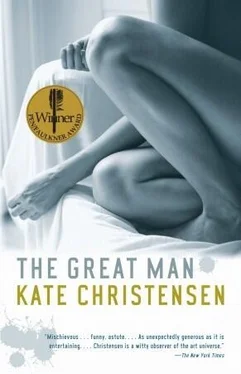“No coffee for me, thank you,” said Ralph. “And I’m sorry to say no cake, either; I have to watch my sugar; diabetes runs in my family.”
“Too bad for you,” said Ruby. “My mother’s blueberry cake could launch ships. I’ll have his piece, too, Mom.”
Teddy got up and went into the kitchen, laden with empty soup bowls and salad plates.
Ruby took a drink of wine, then looked hard at Ralph. “What’s your grand theory about my father?” she asked. “I know you have one.”
“My grand theory about Oscar?”
“Come on.”
“He was a great painter.”
“Obviously, you think that; otherwise, you wouldn’t be going to all this trouble. I mean the guiding idea you’re going to marshal these interviews and all your research around.”
“What makes you think I have one?”
“I know you have one,” she said. “Come on, what do you think of his work, honestly?”
There was a silence brimming with all sorts of thoughts in both their heads.
“My only criticism of Oscar’s work,” said Ralph slowly after a moment, “if that’s what you’re looking for, is that his adherence to figuratism made him great and original but paradoxically might have kept him from achieving his full potential. I say might —this is pure hypothetical speculation. Maybe, if he had allowed himself to flower into abstraction the way de Kooning did with his female nudes, he would have become both one of the foremost painters of his generation and one of the greatest. As it was, he was simply one of the greatest, which is nothing to sneeze at. But the way de Kooning stretched the female form, pushed it as far as it could go into abstraction without losing the integrity of the woman’s individual self…His nudes are glorious and remarkable for their perfectly balanced tension between paint and flesh. Oscar’s nudes, in light of de Kooning’s, have a slight tendency to seem didactic and self-limiting, but only in their literalness, and only in that one respect.”
“If my father had heard you say that, he would have socked you in the eye.”
“No doubt.”
“I grew up here in Greenpoint,” said Ruby. “Where did you grow up, Ralph?”
“Born and raised in Fort Greene.”
“So you know how, walking down the street, you see people in motion, on the fly, blurred. One face jumps out of the crowd at you. It’s a blink, a glimpse, but you feel like you’ve really seen that person; then you’re on to the next…. Growing up in the city, you are constantly seeing the faces of strangers, your eye taking them in so intimately, so briefly.”
“Yes,” he said, leaning forward, his eyes alight, narrowed.
“And you know how at the end of a day of being in the streets, walking to school, messing around with your friends, you lie in bed and you remember the faces sort of like afterimages right before you fall asleep? They collect in your retinas and play themselves back like a slide show on your eyelids, all these strangers your eyes collected through the day.”
“Yes,” he said again in a rapt voice. “I know exactly what you mean.”
“Dad’s paintings always bring back that feeling to me. Some more than others. The mystery of strangers. It’s just stupid to think of his paintings as self-portraits.”
His bedazzled expression turned immediately blank and inoffensive. “Oh, I never said—”
“I know you didn’t, but a couple of clueless critics did, and it infuriated him. Nothing wrong with self-portraits, but it just completely missed the point. My father wasn’t portraying his own psyche in female nudes; that’s like saying he should have ‘flowered into abstraction.’”
She shot a glance at Ralph, who had assumed a blank, pleasant, attentive expression.
“Of course he was monstrously self-involved, my father, but when he looked at you, he saw you and not himself. He had an appetite for other people’s stories, their souls even. He was visceral, not reflective…. His paintings are about seeing people, not paint, not shapes, not abstraction, but people, women, in the flesh — not intellectualized, personalized, romanticized, anything-ized.”
“De Kooning also—”
“When I look at my father’s paintings, I get that same sort of kick you get on the street when you apprehend a stranger, whole.”
“Are you an artist, too?”
“No,” said Ruby. “I teach English at a public high school on the Lower East Side.”
“Well, it’s admirable how passionate you are about your father’s work.”
“Well,” said Ruby, “you’re passionate about it, too.”
“Of course.”
“But you’re wrong about abstraction.”
“No doubt,” he said without conviction.
Teddy came back in, carrying the cake on top of dessert plates, two forks in one fist. She set it all onto the table; then she bore away the soup pot. Ruby didn’t get up to help her mother.
When Teddy was out of earshot, Ruby said, “I think it’s hard for my mother to talk about my father like this. She was crazy about him. I’ve never seen anyone so crazy about anyone else as she was about him. He loved her back, but in a totally different way.”
“Must be wonderful,” said Ralph, “to be the daughter of two people so in love.”
“Not especially.”
“That’s not what I expected you to say.”
“My grand theory about my parents is this. My mother was the lover and my father was the beloved. From watching them, I drew the conclusion that it’s best to be the lover, the one who adores and pursues. Love is tangentially about power, and the beloved has less power than the lover, all appearances to the contrary. In other words, my mother had more power over my father than he did over her. That’s always how it works, no matter how it may appear on the surface.”
“Always?” said Ralph, mostly to keep her talking. “What about balanced relationships, where two people love and are loved in equal measure?”
“Oh, please, that’s impossible. From what I’ve seen anyway. One person is the adorer and cherisher and the other is the adored and cherished. Whenever Mom distanced herself from Dad, which was rarely, believe me, he sort of fell apart. I could see it, even as a little girl. He needed her; she made it a point not to need him. But she loved him.”
“That’s interesting,” he said.
“Sometimes it works the other way; sometimes a man is the lover, the uxorious husband…. That’s a word that means pathologically proud of his wife. Isn’t that a great word? No one uses it anymore. My brother-in-law, Ivan, for example. My sister is much younger than he is. She’s not intellectual really, although she’s smart and has a B.A. in art, and she’s a painter, but she never paints because she’s got two kids under four. Meanwhile, Ivan has a doctorate in biochemistry and is a senior research fellow at the Starr-McGee Institute. She’s thirty-nine; he’s fifty. He possesses and controls her. He needs to know where she is every minute. I think he’s the real reason she’s not here today; he doesn’t want her doing anything without him. I’m sure he took the car to keep her a prisoner in their house. And she loves this kind of treatment! She plays right into it. She always wanted to be close to Dad but never could, so obviously Ivan makes up for that in many ways.”
Ruby splashed more wine into her glass, drank some, set it down again, all while Ralph waited.
“Of course, my mother is proud that she was never controlling of my father, but that depends on what you mean by controlling. …For example, she loved to bait him and goad him and get him to go off about this and that in front of other people, show him off. She’d be right there, contradicting him so he’d reveal more and more of himself. She was so proud of him, of course; she adored him…. But it was a kind of power mongering, in a way. In a way, she controlled him with her love.”
Читать дальше












